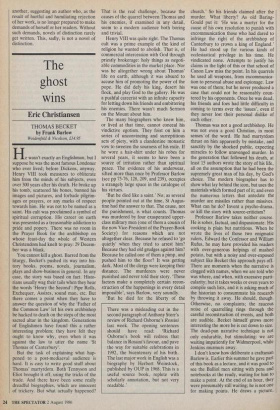Not quietly desperate but defiantly humorous
Francis King
AN ACADEMIC QUESTION by Barbara Pym Macmillan, £9.95 T. wo weeks ago Anita Brookner pub- lished in the Spectator what was more a general appraisal of Barbara Pym than a review of an American professor's book about her. The piece was fascinating for two reasons: firstly because Miss Brook- ner's `sober, scrupulous, yet slightly puz- zled account' (I quote from one of the two sentences in which she actually referred to the American's work) could not, given so intelligent and perceptive a critic, fail to be interesting; and secondly because, in writ- ing about Barbara Pym, Miss Brookner seemed, perhaps without realising it, also, to some degree, to be writing about her- self.
Both these women might be described as spinster novelists. Spinsterhood is the dominant theme of both, with their books repeatedly concerned with women who, to put it crudely, fail to get their men. The difference is that, whereas one sees the typical Brookner heroine consoling herself for yet another disappointment by settling down for the evening on a well-upholstered sofa with a copy of the Burlington Maga- zine, in similar circumstances one sees the typical Pym heroine briskly striding out to the local church to lend a hand at a jumble sale. The tone of the one is resignedly elegiac, the tone of the other defiantly humorous.
Where I think that Miss Brookner's piece went astray was in her assumption that Barbara Pym's life was one of quiet desperation. As no more than a passing acquaintance, I myself once made that same assumption; but a lifelong friend of hers, whose judgment I respect, then persuaded me that, in as far as any human being can be said to be happy, she was happy. Clearly, here was one of those by no means uncommon people who, in affairs of the heart, subconsciously prefer to travel hopefully than to arrive. Men rejected her, publishers rejected her; but I no longer believe, as Miss Brookner does, that these rejections bred in her 'a bitter- ness, a tragic wistfulness, and even a touch of mania. .
Her now posthumously published An Academic Question, written in 1970, was clearly an attempt to move out of the narrow territory of the spinster novel and so to escape from the `cosiness' that her then publishers had diagnosed as the fatal flaw in her work. The `I' of the first-person narrative, Caro, is a Guardian-reading young woman married to an ambitious, not wholly likeable ethno-historian, Alan, at a redbrick university. She has a four-year- old daughter, a Swedish au pair, and absolutely no interest in the doings of the local clergy. Yet, essentially, she persists in remaining the Pym spinster heroine already so familiar to us. One of her two chief confidants is a sexless, fortyish, mother-dominated male lecturer in Alan's department, who is capable of asking her `Do you mind not being beautiful?' and who, at a moment of crisis for her, is more concerned that an insect may be squashed on her blouse than that the heart beneath it may have been bruised by the discovery that Alan has been unfaithful. Caro labours under the curious Pym mis- apprehension that, if men are extremely busy, they have no time for sex. She can be cruelly witty, as when she describes a woman as having 'huge limbs like a piece of modern sculpture'. She can also be merely cruel, as when she has to restrain herself from telling an old woman who has been complaining about 'filthy' plays on television, `But they're not meant for you. . . you pathetic old creature with your too-bright lipstick and your raddled old face. Nothing's meant for you now.'
Miss Brookner's comment that impro- visations of plot constituted a fault to which Barbara Pym was always prone, is certainly valid here, though I dispute its validity for many of the other novels. Such plot as there is in An Academic Question revolves around an ancient retired mission- ary, to whom, in his near-blindness in an old people's home presided over by Sister Dew (Pym devotees will remember her with pleasure from earlier novels), Caro acts as reader. The missionary is hoarding some unpublished papers, written by him when in Africa, which are vital both to Alan and an academic rival for their researches. Eventually Alan seizes the papers, to make them the basis for an article in a learned journal in which he demolishes his rival. All this academic intrigue is lifeless and perfunctory; and the final denouement, in which the papers, now deposited in the university library, are destroyed in a fire started by the students, is handled in a manner so off-hand as almost to be cheeky.
What one treasures are the occasional passages in which, suddenly, one is con- scious of a gear-shift, so that, instead of rattling along at 40 miles an hour, the antiquated banger all at once swerves into the fast lane and miraculously picks up speed. Such a passage is the account, at once funny and sombre, of a funeral that Caro attends on behalf of Alan. Such passages, too, are those in which Caro's other confidante, an elderly female eccen- tric — 'more moved by the sight of a hedgehog's little leg raised to scratch itself than by any memory of past love' — is delineated with wry affection.
Barbara Pym wrote of this book to Philip Larkin: 'It was supposed to be a sort of Margaret Drabble effort.' A Margaret Drabble novel is one thing — a fine thing; but 'a sort of Margaret Drabble effort' is another, suggesting an author who, as the result of hurtful and humiliating rejection of her work, is no longer prepared to make demands of herself or her readers. Without such demands, novels of distinction rarely get written. This, sadly, is not a novel of distinction.











































 Previous page
Previous page